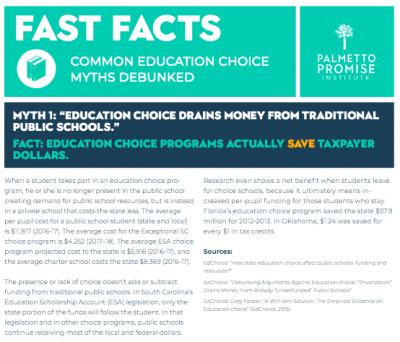This article was first published on palmettopromise.org
Earlier this month, the online opinion journal EducationNext rolled out the results of its annual poll on issues in American education. We always anticipate this nonpartisan survey because it provides a window into the minds of the general public on issues we track here at Palmetto Promise, like education choice and school funding. Although the survey includes numerous data points covering the opinions and knowledge of the average American on a variety of topics, a couple of sections stood out to us – one encouraging, the other…not so much.
First, the good news. The EducationNext poll showed that support for private school choice programs continues to grow. Parents want choices for the unique needs of their children. This is confirmation of what survey after survey has shown, both in South Carolina and nationwide.
But on the issue of choice, the poll also revealed how little Americans seem to actually know about the details. For example, many of those polled believed charter schools could be religious in nature or could make a profit—both of which are untrue. And that’s just two of several areas of confusion.
Is it urgent that a majority of Americans know every minute detail of the policy mechanisms of choice? Probably not. But it is our experience that with more knowledge, support grows even more! With that in mind, Palmetto Promise has put together another of our “Fast Facts” publications, this one aimed at debunking the most common myths surrounding education choice.
With so much one-sided information and politically charged opinion on education out there it can be difficult for people, and most importantly parents, to see through the buzzwords… especially when it comes to school choice, a buzzword of its own. We believe education choice is a better description as new and innovative models allow parents to choose options for their children that don’t fit the traditional “seat in a school building” education model.
The conversation surrounding the issue of choice may lead to questions like: Do private education choice programs really take money away from public schools? Are education choice programs actually perpetuating racial segregation?
Palmetto Promise is here to help answer those questions and many more. We’ve compiled the most common arguments against education choice and have answered each using both South Carolina-specific data and examples from neighboring states.


